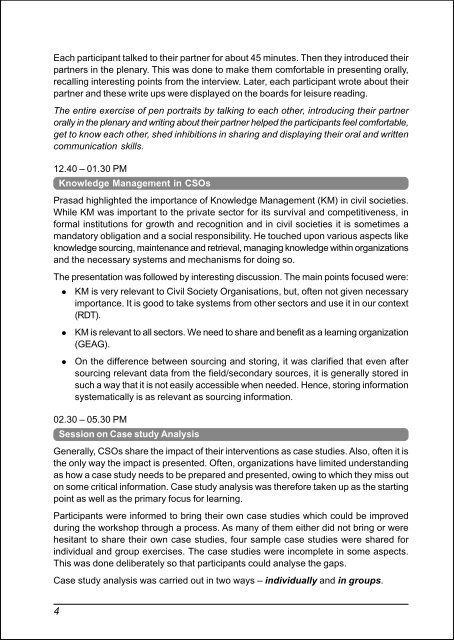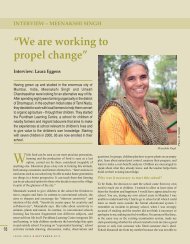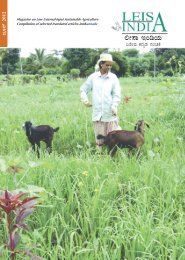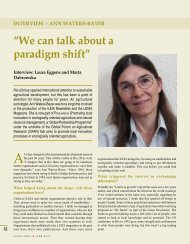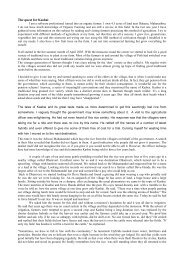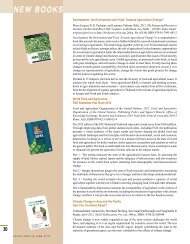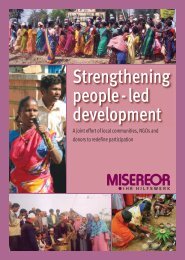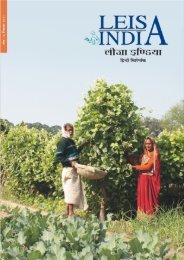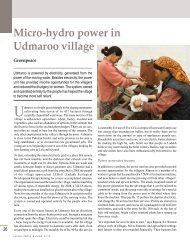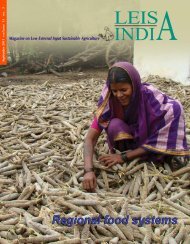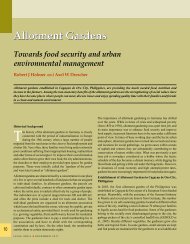Workshop on Knowledge Management in Civil Society ... - Leisa India
Workshop on Knowledge Management in Civil Society ... - Leisa India
Workshop on Knowledge Management in Civil Society ... - Leisa India
You also want an ePaper? Increase the reach of your titles
YUMPU automatically turns print PDFs into web optimized ePapers that Google loves.
Each participant talked to their partner for about 45 m<strong>in</strong>utes. Then they <strong>in</strong>troduced theirpartners <strong>in</strong> the plenary. This was d<strong>on</strong>e to make them comfortable <strong>in</strong> present<strong>in</strong>g orally,recall<strong>in</strong>g <strong>in</strong>terest<strong>in</strong>g po<strong>in</strong>ts from the <strong>in</strong>terview. Later, each participant wrote about theirpartner and these write ups were displayed <strong>on</strong> the boards for leisure read<strong>in</strong>g.The entire exercise of pen portraits by talk<strong>in</strong>g to each other, <strong>in</strong>troduc<strong>in</strong>g their partnerorally <strong>in</strong> the plenary and writ<strong>in</strong>g about their partner helped the participants feel comfortable,get to know each other, shed <strong>in</strong>hibiti<strong>on</strong>s <strong>in</strong> shar<strong>in</strong>g and display<strong>in</strong>g their oral and writtencommunicati<strong>on</strong> skills.12.40 – 01.30 PM<strong>Knowledge</strong> <strong>Management</strong> <strong>in</strong> CSOsPrasad highlighted the importance of <strong>Knowledge</strong> <strong>Management</strong> (KM) <strong>in</strong> civil societies.While KM was important to the private sector for its survival and competitiveness, <strong>in</strong>formal <strong>in</strong>stituti<strong>on</strong>s for growth and recogniti<strong>on</strong> and <strong>in</strong> civil societies it is sometimes amandatory obligati<strong>on</strong> and a social resp<strong>on</strong>sibility. He touched up<strong>on</strong> various aspects likeknowledge sourc<strong>in</strong>g, ma<strong>in</strong>tenance and retrieval, manag<strong>in</strong>g knowledge with<strong>in</strong> organizati<strong>on</strong>sand the necessary systems and mechanisms for do<strong>in</strong>g so.The presentati<strong>on</strong> was followed by <strong>in</strong>terest<strong>in</strong>g discussi<strong>on</strong>. The ma<strong>in</strong> po<strong>in</strong>ts focused were: KM is very relevant to <strong>Civil</strong> <strong>Society</strong> Organisati<strong>on</strong>s, but, often not given necessaryimportance. It is good to take systems from other sectors and use it <strong>in</strong> our c<strong>on</strong>text(RDT).KM is relevant to all sectors. We need to share and benefit as a learn<strong>in</strong>g organizati<strong>on</strong>(GEAG).On the difference between sourc<strong>in</strong>g and stor<strong>in</strong>g, it was clarified that even aftersourc<strong>in</strong>g relevant data from the field/sec<strong>on</strong>dary sources, it is generally stored <strong>in</strong>such a way that it is not easily accessible when needed. Hence, stor<strong>in</strong>g <strong>in</strong>formati<strong>on</strong>systematically is as relevant as sourc<strong>in</strong>g <strong>in</strong>formati<strong>on</strong>.02.30 – 05.30 PMSessi<strong>on</strong> <strong>on</strong> Case study AnalysisGenerally, CSOs share the impact of their <strong>in</strong>terventi<strong>on</strong>s as case studies. Also, often it isthe <strong>on</strong>ly way the impact is presented. Often, organizati<strong>on</strong>s have limited understand<strong>in</strong>gas how a case study needs to be prepared and presented, ow<strong>in</strong>g to which they miss out<strong>on</strong> some critical <strong>in</strong>formati<strong>on</strong>. Case study analysis was therefore taken up as the start<strong>in</strong>gpo<strong>in</strong>t as well as the primary focus for learn<strong>in</strong>g.Participants were <strong>in</strong>formed to br<strong>in</strong>g their own case studies which could be improveddur<strong>in</strong>g the workshop through a process. As many of them either did not br<strong>in</strong>g or werehesitant to share their own case studies, four sample case studies were shared for<strong>in</strong>dividual and group exercises. The case studies were <strong>in</strong>complete <strong>in</strong> some aspects.This was d<strong>on</strong>e deliberately so that participants could analyse the gaps.Case study analysis was carried out <strong>in</strong> two ways – <strong>in</strong>dividually and <strong>in</strong> groups.4


